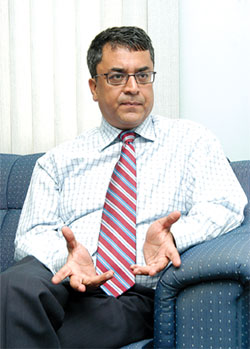|
|
Radhesh Pant, managing director of the Bank of Kathmandu, spoke to Nepali Times this week about the state of banking and the business environment in Nepal.
Nepali Times: What does Bank of Kathmandu (BoK) consider its unique qualities?
Radhesh Pant: Bank of Kathmandu was established 13 years ago and is wholly owned by Nepalis. We rank fifth in Nepal in terms of revenue and profitability. [A large proportion of its shares] are public, we've managed our operating costs well, and have grown steadily-we have 12 branches and two counters. We're doing a lot of homework focussing on our niche, which shall help sustain us in the future.
What are the challenges for BoK?
There's overcrowding in the banking industry, so there will be competition in pricing and quality services. Our focus is long term. We have to capitalise on the fact that we are in all five development regions and that we are wholly Nepali-owned. We started operating satellite branches to minimise costs-these have no more than five staff, some part-time or on contract. We are also looking to invest in new areas such as rural or micro finance. Technology has always been our strength-we use one of the best banking software packages available, Finacle by Infosys, and would like to maximise its use in the future.
What's your assessment of the state of banking in Nepal?
On the one hand there is congestion in the banking sector but on the other, you see that about 85 percent of Nepalis don't have access to banking. There are a lot of players, but there is a huge market yet to be penetrated. Due to instability over the past few years, the investment climate has not been good, which led to a stagnation of the private sector. That was when banks entered retail, but retail is also getting crowded, which is why the banking sector needs to move on identifying different opportunities. Banks will have to be really competitive and try to create their niche market, or they'll have to start consolidating through mergers and acquisitions in order to become a cost player. There are a lot of things we can do in the 'New Nepal' and we're looking forward to those opportunities. But in the current situation, international and domestic investors are still apprehensive about investments in Nepal, and not much is coming in.
So there are real challenges.
The first challenge for banks and for the state is to be able to attract investment in the country. Second, in banking, new products have to be introduced. The banking industry cannot sustain itself just with deposits and credits. We need expertise in investment banking, analysing projects, raising capital, new financing techniques. We need to focus on some core sectors-hydropower, infrastructure, tourism, herbs-we need to understand and analyse the financing of those sectors. And finally, I believe that we need to play a major role in providing access to finance in rural Nepal.
And what about the business environment?
It's quite pathetic. Look at the last two months, especially in the tarai, where business has come to a complete halt. The numerous problems with security and labour are not good for business.
What does the future look like for BoK?
We want to grow in a sustainable manner. We're planning three more branches this fiscal year, and will venture into small-medium enterprises and rural and micro finance. BoK already has 150 odd agents connected throughout the country by 'BOK Money Transfer'-an in-house product-for inward money remittance. We want to build on that, and grow the remittance we receive from abroad by deploying resources.



